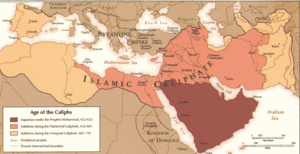Caliphate: Difference between revisions
imported>Minhaj Ahmed Khan Lodi No edit summary |
imported>Minhaj Ahmed Khan Lodi No edit summary |
||
| Line 1: | Line 1: | ||
A '''caliphate''' (from the [[Arabic]] '''خلافة''' or ''khilāfah''), is considered by most Muslims as the ideal Islamic form of government representing the political unity and leadership of the Muslim world. The post of caliph comprises of the unity of [[head of state]], [[head of government]], and [[head of religion]]. The literal meaning of caliph is 'successor', as in, successor to [[Muhammad]]'s political authority. | A '''caliphate''' (from the [[Arabic]] '''خلافة''' or ''khilāfah''), is considered by most Muslims as the ideal Islamic form of government representing the political unity and leadership of the Muslim world. The post of caliph comprises of the unity of [[head of state]], [[head of government]], and [[head of religion]]. The literal meaning of caliph is 'successor', as in, successor to [[Muhammad]]'s political authority. | ||
[[Image: | [[Image:Age_of_the_Caliphs.gif|300px|thumb|The Caliphate, 622-750]] | ||
By the [[Sunni]] muslim view, he is ideally a member of the [[Quraysh]] tribe [[Election|elected]] democratically by the majority of the Muslim population. According to the [[Shi'a]], he is an [[Imam]] descended directly from the [[Ahl ul-Bayt]]. According to the [[Ibadi]] view, any Muslim who is just and righteous is fit to take the post. | By the [[Sunni]] muslim view, he is ideally a member of the [[Quraysh]] tribe [[Election|elected]] democratically by the majority of the Muslim population. According to the [[Shi'a]], he is an [[Imam]] descended directly from the [[Ahl ul-Bayt]]. According to the [[Ibadi]] view, any Muslim who is just and righteous is fit to take the post. | ||
Revision as of 06:13, 25 February 2008
A caliphate (from the Arabic خلافة or khilāfah), is considered by most Muslims as the ideal Islamic form of government representing the political unity and leadership of the Muslim world. The post of caliph comprises of the unity of head of state, head of government, and head of religion. The literal meaning of caliph is 'successor', as in, successor to Muhammad's political authority.
By the Sunni muslim view, he is ideally a member of the Quraysh tribe elected democratically by the majority of the Muslim population. According to the Shi'a, he is an Imam descended directly from the Ahl ul-Bayt. According to the Ibadi view, any Muslim who is just and righteous is fit to take the post.
The post of caliph has been held by the democratically elected Rashidun caliphs, and by the monarchist caliphates, chiefly the Ummayads, the Abassids, the Ottomans, and the Fatimids. The only era in history when the Shi'a post of Imam and caliph were combined was during the Fatimid caliphate.
The last caliphate, the Ottoman caliphate, was abolished in 1926 following Mustafa Kemal's revolution in Turkey. Since then, there have been various attempts to re-establish the caliphate, peacefully and violently. For example, Hizb ul-Taheri seeks the peaceful re-establishment of the caliphate, while Al Qaeda seeks to re-establish it through a violent revolution. Currently, the closest entity to the caliphate is the Organization of the Islamic Conference.
